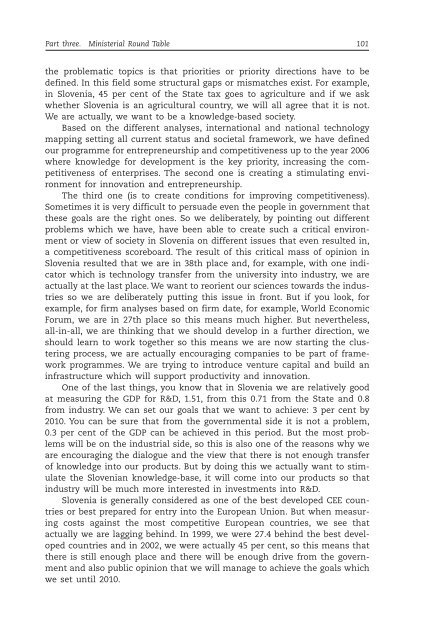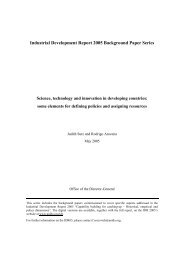TECHNOLOGY FORESIGHT SUMMIT - Unido
TECHNOLOGY FORESIGHT SUMMIT - Unido
TECHNOLOGY FORESIGHT SUMMIT - Unido
Create successful ePaper yourself
Turn your PDF publications into a flip-book with our unique Google optimized e-Paper software.
Part three. Ministerial Round Table 101<br />
the problematic topics is that priorities or priority directions have to be<br />
defined. In this field some structural gaps or mismatches exist. For example,<br />
in Slovenia, 45 per cent of the State tax goes to agriculture and if we ask<br />
whether Slovenia is an agricultural country, we will all agree that it is not.<br />
We are actually, we want to be a knowledge-based society.<br />
Based on the different analyses, international and national technology<br />
mapping setting all current status and societal framework, we have defined<br />
our programme for entrepreneurship and competitiveness up to the year 2006<br />
where knowledge for development is the key priority, increasing the competitiveness<br />
of enterprises. The second one is creating a stimulating environment<br />
for innovation and entrepreneurship.<br />
The third one (is to create conditions for improving competitiveness).<br />
Sometimes it is very difficult to persuade even the people in government that<br />
these goals are the right ones. So we deliberately, by pointing out different<br />
problems which we have, have been able to create such a critical environment<br />
or view of society in Slovenia on different issues that even resulted in,<br />
a competitiveness scoreboard. The result of this critical mass of opinion in<br />
Slovenia resulted that we are in 38th place and, for example, with one indicator<br />
which is technology transfer from the university into industry, we are<br />
actually at the last place. We want to reorient our sciences towards the industries<br />
so we are deliberately putting this issue in front. But if you look, for<br />
example, for firm analyses based on firm date, for example, World Economic<br />
Forum, we are in 27th place so this means much higher. But nevertheless,<br />
all-in-all, we are thinking that we should develop in a further direction, we<br />
should learn to work together so this means we are now starting the clustering<br />
process, we are actually encouraging companies to be part of framework<br />
programmes. We are trying to introduce venture capital and build an<br />
infrastructure which will support productivity and innovation.<br />
One of the last things, you know that in Slovenia we are relatively good<br />
at measuring the GDP for R&D, 1.51, from this 0.71 from the State and 0.8<br />
from industry. We can set our goals that we want to achieve: 3 per cent by<br />
2010. You can be sure that from the governmental side it is not a problem,<br />
0.3 per cent of the GDP can be achieved in this period. But the most problems<br />
will be on the industrial side, so this is also one of the reasons why we<br />
are encouraging the dialogue and the view that there is not enough transfer<br />
of knowledge into our products. But by doing this we actually want to stimulate<br />
the Slovenian knowledge-base, it will come into our products so that<br />
industry will be much more interested in investments into R&D.<br />
Slovenia is generally considered as one of the best developed CEE countries<br />
or best prepared for entry into the European Union. But when measuring<br />
costs against the most competitive European countries, we see that<br />
actually we are lagging behind. In 1999, we were 27.4 behind the best developed<br />
countries and in 2002, we were actually 45 per cent, so this means that<br />
there is still enough place and there will be enough drive from the government<br />
and also public opinion that we will manage to achieve the goals which<br />
we set until 2010.

















